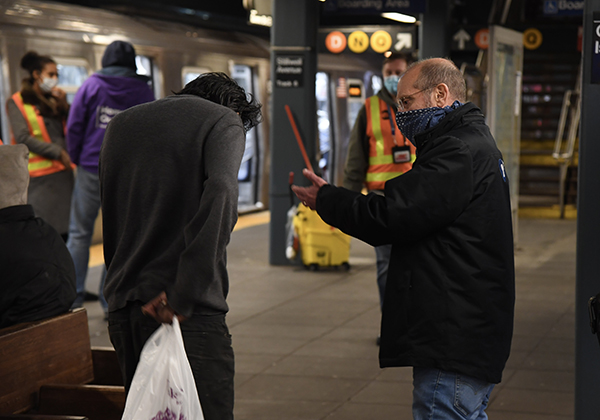
WINDSOR TERRACE – The nighttime shutdown of the subway has shined a harsh spotlight on the depth of the homeless problem in the city’s transit system during the coronavirus pandemic.
But there is working going on to help the homeless, according to religious organizations and other advocates. Charitable groups and non-profit organizations are stepping up to distribute food, toiletries and other emergency supplies.
Homeless people, who have been riding trains non-stop at a time when most New Yorkers are staying home, are forced out of the transit system each night at 1 a.m. so that the Metropolitan Transportation Authority can clean and disinfect all of the trains as well as all 472 stations. The closure began on May 6. The entire subway system is shut down from 1 a.m. to 5 a.m.
.The Guardian Angels, the crime prevention patrol group founded by Curtis Sliwa in 1979, go into the subway when trains are running to bring food to the homeless. Sliwa, a talk show host on 77 WABC Radio, approaches homeless people and rubs sanitizer on their arms and legs to try to prevent coronavirus infections.
“There’s a growing number of homeless people on the subway. They don’t want to go to shelters,” Sliwa said. “Shelters are petri dishes for coronavirus. There’s about three feet between one bunk and the next. Social distancing is impossible. It’s clear the homeless people looked at it and said to themselves they’re less likely to get it on the subway, even though they have to scrounge for food. They made a calculation.”
Will M., a formerly homeless man who now works for a Catholic organization that helps the underprivileged, said he used to avoid shelters. “I let my life go. I got into substance abuse. The first time I walked into a shelter, I was devastated. It was dangerous. I saw lots of things, like drug deals, a lot of violence. You’d rather be on the subway because nobody bothers you,” he said.
The New York City Department of Homeless Services (DHS) has been stepping up its outreach efforts since the start of the subway shutdown.
“In the first several days of this unprecedented overnight initiative, we’ve conducted hundreds of engagements, with many individuals accepting referrals to services of some kind, including hospital care or shelter, and being transported to those services as a result,” DHS spokesman Isaac McGinn said.
Mayor Bill de Blasio announced on May 12 that the outreach has seen results. On a recent morning, for example, 362 individuals were engaged by outreach workers and specially trained police officers. Of those, 211 accepted help; 178 went to shelters and 33 went to hospitals.
“Every single night, we’re seeing the same things, high level of engagement, large number of homeless individuals being engaged, the majority accepting help,” de Blasio said.
It isn’t a quick or easy process, according to McGinn. “We know that it can take hundreds of engagements for someone to accept services and that someone who’s not ready to do so today may be ready to make that transition tomorrow,” he said.
Sister Caroline Tweedy R.S.M., executive director of St. John’s Bread & Life, a program established at St. John the Baptist Church in Bedford-Stuyvesant in 1982, said convincing a homeless person to agree to housing can be an uphill climb. “Sometimes, they prefer living on the street,” she said. “They look at the shelter almost like it’s a jail.”
Still, there are success stories that make it worthwhile, Tweedy said. She told the story of a 65-year-old woman who refused help for a long time before finally accepting. “When I met her, she was sleeping in a bathtub in an abandoned building,” she said. “For the last six months she has been housed and is paying rent.”
St. John’s Bread & Life, which started out as a soup kitchen, expanded its mission over the years to include proving clothing, social service referrals, housing advocacy and legal advice.
The program operates out of a building at 795 Lexington Ave. in Brooklyn and helps an estimated 22,000 people a year. The program was recently awarded a $150,000 emergency response grant by the Leona M. and Harry B. Helmsley Charitable Trust.
The Guardian Angels have been working with the homeless for many years, Sliwa said. “We give them food but the thing they want most from us is water. And conversation. We have long conversations with them. They’re human beings. Treat them that way,” he said.
To read the latest updates regarding coronavirus concerns in the Brooklyn Diocese, go to https://thetablet.org/coronavirus.
